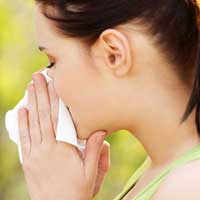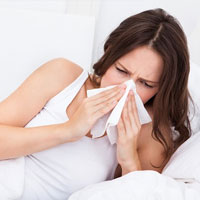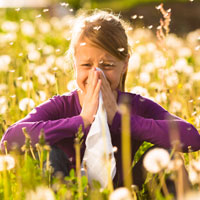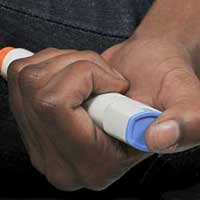What is an Allergy?
Did you know that 20% of the population is affected by allergic rhinitis?
Allergy is a damaging immune response by the body to a specific substance, and common ones include food items, pet dander, pollen or dust. Allergies are also considered as diseases and are a significant cause of illness in the United States. According to a recently conducted survey, about one in five people have some type of allergy.
The substances that causes an allergic reaction are foreign and are called allergens. Allergy symptoms are usually not a matter of grave concern, as several treatments are available for you to use against symptoms of an allergic reaction; you also have the option of using allergy medicines to counter allergic reactions.
What causes an Allergic Reaction?
An allergy of any kind is caused by your immune system being hypersensitive to substances in the environment, despite these substances not being harmful for the majority of people and thus not regarded as a general health risk. The best example of this would be the pollen emitted by plants and flowers as they bloom in springtime. For a person with seasonal allergies, or ‘hayfever’ as it’s commonly referred to, inhaling the pollen will cause them to have an allergic reaction. Atopic dermatitis, allergic asthma and anaphylaxis are further examples among many others.
Certain foods, insect bites and medications may also cause a severe allergic reaction depending on a person’s physiology. Allergies can be both due to genetic and environmental factors, and dust allergies are an example of one allergy that’s both common and an example of both factors contributing to cause an allergic reaction.
A brief detail of the workings of an allergic reaction is as follows; the body mistakes a substance as harmful, and in response to it the immunoglobin E antibodies (IgE) of the body’s immune system then bind to the allergen and proceed to trigger the release of inflammatory chemicals called histamines that cause you to experience the allergic symptoms discussed in detail below.
Signs and symptoms of an Allergic Reaction:
Depending on the allergen and where it enters your body after coming into contact with it, you may experience different symptoms. This means that, for example, if you have a food-related allergy you will probably experience bowel irregularities.
However, in some cases you may experience varied symptoms across different parts of your body.
Here is a list of the most common allergy types, and each is listed with the symptoms that commonly come with them:
Food Allergy
Food allergies are most common in children but can develop later on as well. Symptoms include:
- Vomiting or stomach cramps
- Hives
- Shortness of breath
- Wheezing
- Coughing
- Circulatory collapse
- Swelling and inability to talk
- Fainting and dizziness
- A severe reaction called Anaphylaxis where the ability to breathe is compromised and the body goes into varying degrees of shock.
Dust Allergy
Dust mites are allergens that populate indoor areas where excessive dust has accumulated, and symptoms can be present all year round; these include:
- Sneezing
- A runny nose
- Red, itchy and teary eyes
- Wheezing
- Tightness in chest
- Itching and breathing difficulties.
Pet Allergy
Experiencing any of the following symptoms around pets like dogs, cats, or rabbits may indicate a pet allergy:
- Sneezing
- Runny nose
- Facial pain due to nasal congestion
- Coughing and breathing difficulties
- Watery eyes
- Skin rashes
- Hives
Allergic Rhinitis
We mentioned hay fever earlier here, but the technical term for it is allergic rhinitis. Rhinitis symptoms can be seasonal or perennial depending on individual physiology and can be caused by any environmental allergen. Symptoms include:
- Runny nose
- Itchy eyes, mouth or skin
- Sneezing
- Nasal congestion
- Fatigue
Insect Sting Allergies
Stings from wasps, yellowjackets, hornets and honeybees can cause severe allergic reactions for some people. Symptoms include:
- Pain
- Redness
- Swelling
- Flushing
- Hives
- Itching
- Anaphylaxis
Drug Allergies
Sometimes people can get allergies from a substance that is contained in certain medicines. These can be liquids, pills or an injection. Symptoms include:
- Skin rashes
- Hives
- Itching
- Wheezing and breathing difficulties
- Swelling
- Anaphylaxis
Allergic Skin Reactions
These kinds of allergic reactions are also known as Contact dermatitis. This condition is described as a reaction that’s produced when your skin tends to come in contact with an allergen (irritant).
Symptoms can include:
- Rash
- Blisters
- Burning
- Itching
- Redness
- Inflammation
- Slight pain
Allergic Conjunctivitis
Allergic Conjunctivitis is an inflammation of the eye due to an allergic reaction to certain substances like mold spores or pollen. The membrane conjunctiva is the part of the eye that covers the eyeball and the inside of the eyelids.
This is another one of the seasonal allergies because it primarily is a condition suffered by those with pollen allergies during hay fever season. The symptoms include:
- Watery eyes
- Eye pain
- Burning sensations in the eyes
- Puffy eyes
Allergy Treatment - Best Allergy Medicine
Having a doctor diagnose your allergy will always precede any course of treatment. This can be done through a physical exam, as well as being aware of eating habits and substances you may have come into contact with. After examining your allergy symptoms, they may suggest you have a blood and skin test done to diagnose the allergens.
Over-the-counter (OTC) antihistamines and decongestants are widely regarded as the best allergy medicines to help relieve minor symptoms of an allergic reaction. They work by preventing symptoms by effectively blocking histamine receptors and making it so that your immune system doesn't begin to react to the allergens.
If your allergic symptoms include swelling, redness, and itching, you may consider using topical creams containing corticosteroids. These are commonly prescribed for skin related allergies.
When it comes to food allergies, the best way to avoid any complications is to avoid the foods that trigger these allergic reactions. If you accidentally ingest a food you’re allergic to, over-the-counter medications can minimize the reaction and your allergic symptoms. Some medications are limited to relieving hives or itching, and some sufferers will find oral cromolyn to be effective for other symptoms. It will require being prescribed by a doctor, however.
Drug allergies can be treated using alternative medications, as prescribed by your doctor. In severe cases, you can also be subjected to a desensitization procedure in which you are instructed to take smaller doses until your body can handle the actual dosage you require.
Many people have allergies to dust, an irritant that is prevalent in many environments and hard to avoid. Immunotherapy is a popular choice to counter dust allergies. It’s a procedure that involves several injections over the course of a few years to encourage your body to get used to your allergy, and once that occurs it effectively prevents further allergic reactions in the future.
Some of the common medications that are often prescribed for allergic symptoms, or can be taken over-the-counter, are:
- Antihistamines
- Corticosteroids
- Cetirizine
- Claritin
- Cromolyn Sodium
- Decongestants
We encourage you to use our list of the best allergy medicines found on the sidebar to be informed about the options you have for treating allergic reactions.
Discussing your allergic complications with your doctor is important, as it will allow them to recommend ideal medications which will work most effectively to combat your allergy symptoms. It is also advisable to mention your allergies any time you are seeing a doctor for other medical conditions, to prevent any severe reactions that may occur due to the medications you will be taking.
One of the frequent and more severe allergic symptoms is the one mentioned previously here, Anaphylaxis. In certain instances anaphylaxis can be life threatening, so individuals who are known to be at risk are encouraged to carry an emergency epinephrine shot, and to seek medical care immediately when an instance occurs.
Lastly, it is advisable that you seek the advice of a qualified medical professional before taking any allergy medication.
References:
- Mental Floss - 10 Common Misconceptions About Allergies




